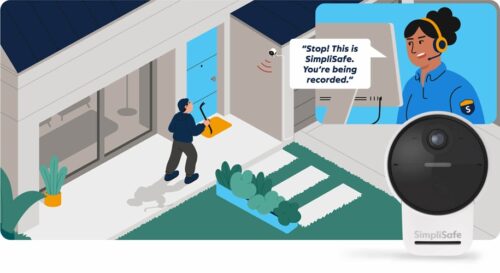
11.19.24 – SIW – Paul Rothman
A highly marketed offering of a 50-year-old alarm technology is likely to generate newfound interest among uninformed residential alarm customers
The holiday shopping season generally marks the beginning of new and innovative offerings from companies from markets far and wide. Many of these offerings were on full display at the recent Pepcom event (live-streamed from New York City).
As I weeded through presentations for coffee makers, self-propelled bikes, and other potential gift goodies, I wondered why I was about to hear from DIY security provider SimpliSafe. I guess a do-it-yourself security camera would make a good gift.
The spokesperson was excited to present SimpliSafe’s newest and greatest innovation, what they call Active Guard Outdoor Protection – which amounts to an AI-enhanced outdoor camera that can be live monitored. As explained, the camera uses AI to determine if a person on camera is not a “normal” occupant or visitor, and “a live agent can speak through the camera using two-way audio, letting the person know they are being recorded and asking them to identify themselves.”
Why is SimpliSafe marketing and promoting this service as if it’s something new, innovative, and exciting? Well, duh, they want to make money, but one thing they aren’t mentioning is history.
Two-way talkdown has been around since Sonitrol introduced it back in the 1970s. You say, well Sonitrol, that’s mostly for commercial applications. Fine. How about a company founded in 1988 that you may remember…it was called AlarmForce. The Canadian company specialized in home security, with two-way talkdown as one of its primary unique selling points. It expanded into the U.S. in the early 2000s, and if you lived in the Southeast, you couldn’t turn on the radio without hearing their familiar jingle and the tagline: “for as little as a dollar a day.”
Because of the increasing costs of live monitoring, for an alarm dealer, it probably isn’t so simple as adding a two-way talkdown camera to the front door and charging a customer an extra 10 bucks a month.
Ah, but inflation! According to the SimpliSafe website, a homeowner can deploy this service for $1.66 per day for only nighttime hours or add another dollar a day for 24-hour monitoring. That’s 50 or 80 bucks a month. A homeowner can likely have a very robust security system that goes far beyond one camera at the door for the same cost** (please see the correction below). That said, monitoring companies are likely discovering that this type of live monitoring offering is much more expensive than previously believed.
Every platform – from ADT to Resideo to DMP to alarm.com, etc. – can offer two-way talkdown (in some form). However, according to a few private chats with some very prominent alarm company owners, two-way talkdown in residential security is not a highly requested service. One of those owners said that among more than 11,000 residential subscribers, maybe 5 or 10 have asked for it.
The catch is that because of the increasing costs of live monitoring, for an alarm dealer, it probably isn’t so simple as adding a two-way talkdown camera to the front door and charging a customer an extra 10 bucks a month.
So perhaps SimpliSafe has done its research, and homeowners really want this technology and are also so blissfully unaware that it hasn’t existed forever. Regardless, SimpliSafe is very good at marketing, and believe me, it will generate demand. As one alarm dealer told me: “We should follow their lead, so we don’t potentially miss out on the space.”
CORRECTION
SimpliSafe reached out to us to correct the point made that the system only includes a camera. Instead, the “Pro” (overnight – $49/mo) and “Pro Plus” (24/7 – $79/mo) plans include everything in the company’s “Core” offering ($31/mo), with professional monitoring benefits (full breakdown here) in addition to the Active Guard Outdoor Monitoring. The plan also allows up to 10 cameras – three of which can be enabled for Active Guard Outdoor Protection.
The security of student data is a top priority. As schools adopt more digital tools, cyber threats grow. Learn how to protect student records and sensitive data from breach risks by using network security best practices, from robust authentication to secure devices.

About the Author
Paul Rothman | Editor-in-Chief/Security Business
Paul Rothman is Editor-in-Chief of Security Business magazine. Email him your comments and questions at prothman@securitybusinessmag.com. Access the current issue, full archives and apply for a free subscription at www.securitybusinessmag.com.
This article originally appeared in the November 2024 issue of Security Business magazine. Don’t forget to mention Security Business magazine on LinkedIn and @SecBusinessMag on Twitter if you share it.
